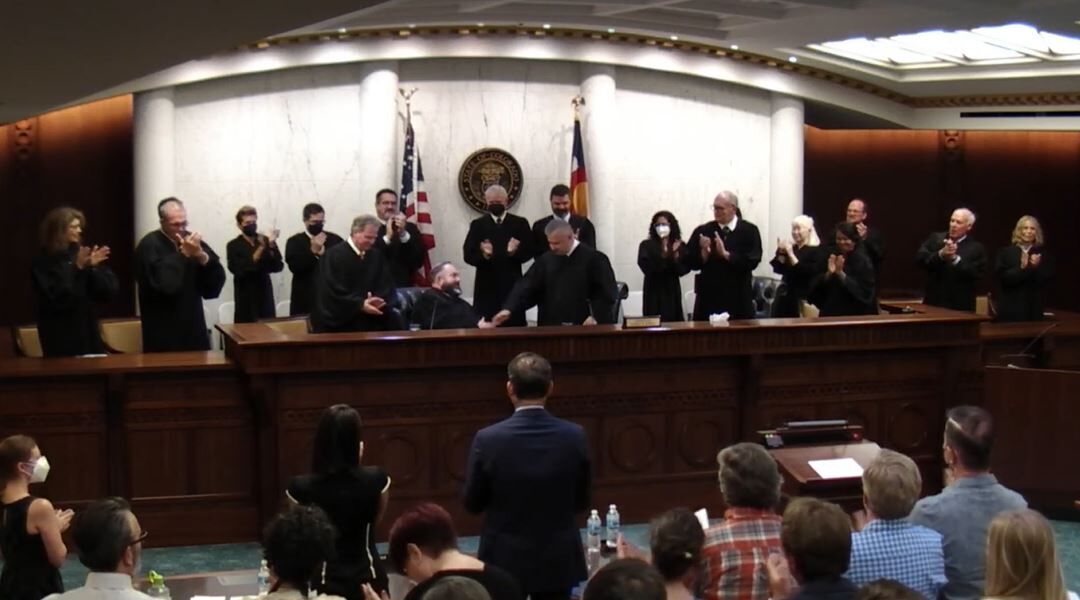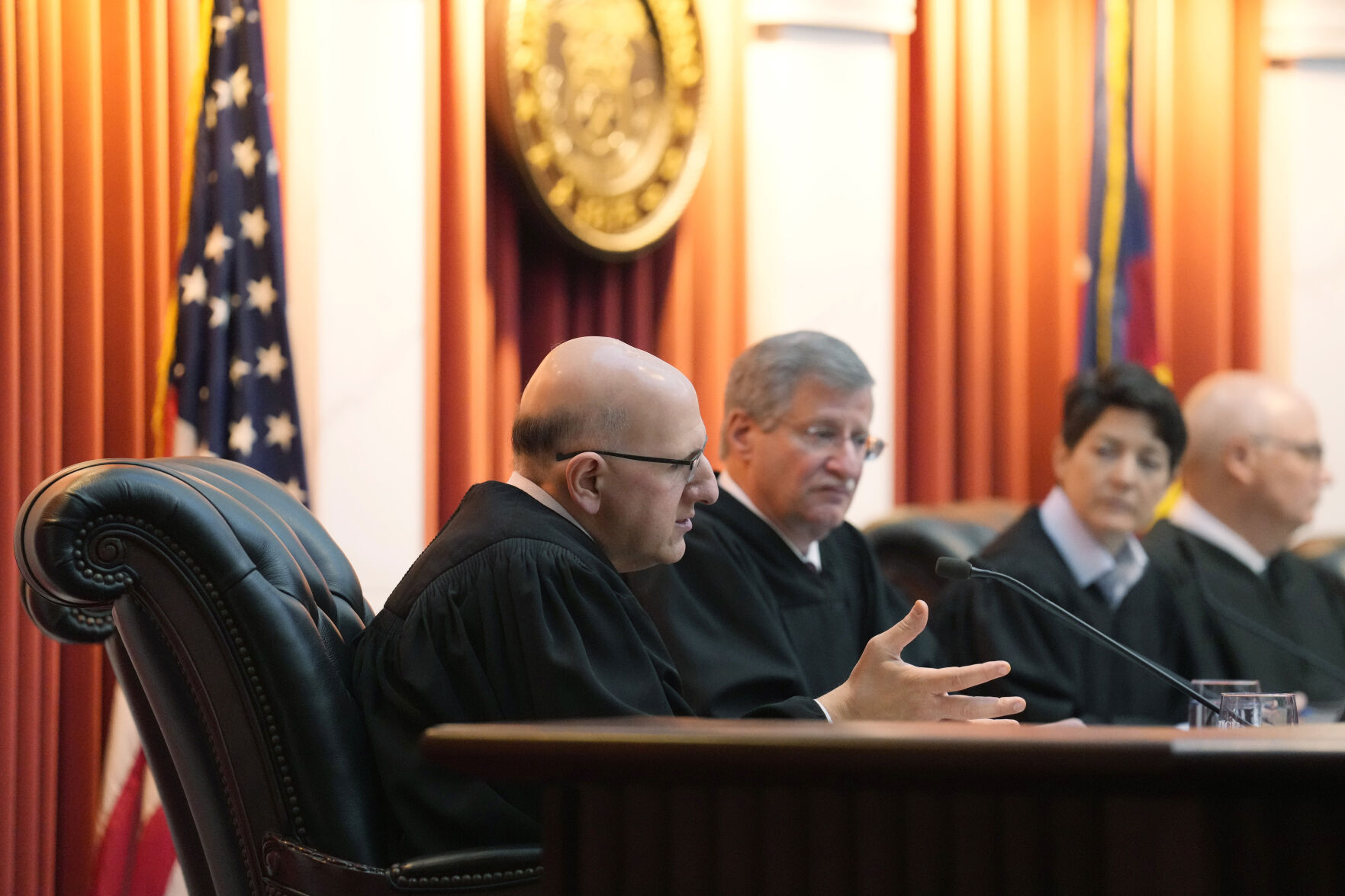Study suggests more judges for appeals court, state Supreme Court’s latest oral arguments | COURT CRAWL

Welcome to Court Crawl, Colorado Politics’ roundup of news from the third branch of government.
A recent report commissioned by the state’s Judicial Department has recommended the addition of six new judgeships on Colorado’s second-highest court, plus the state Supreme Court heard oral arguments in five cases earlier this month.
Heavy docket
? Between 2022 and 2023, the National Center for State Courts studied how all of the personnel who make up Colorado’s Court of Appeals are spending their time. Based on the results, researchers recommended expanding the 22-member court by six judges. The last time the court increased in size was in 2008. Although the judicial branch has not yet requested any funding for court expansion, multiple lawmakers said they are open to the idea. Here is an excerpt from this week’s Colorado Politics cover story:
Judges, in turn, provided their own assessments of their time crunch and the consequences of a heavy workload.
Criminal cases “just take longer because of the current ‘philosophy’ behind criminal appeals,” one judge responded, criticizing defendants for appealing “every issue” and the prosecution for “never conceding issues.”
“I devote all the time needed to PDMs that come from my chambers, but if something has to give, it is other chambers’ PDMs,” read another judge comment, referring to the predisposition memorandums of draft opinions.
“More time spent conferencing with the other judges on their opinions to improve quality would be nice, but there isn’t the time right now,” another judge said.
Personnel at all levels reported cutting back on non-case-related activities – like internal committee participation, meetings and trainings – to prioritize their casework. One judge lamented that when it comes to participating in events with the legal community, there is not an “even distribution” of judges represented because “we are all pressed for time.”

Cases heard
? The state Supreme Court held oral arguments in five cases earlier this month. First, the justices pondered whether Colorado law can automatically create the type of consent needed for police to extract blood from suspected drunk drivers, even when the driver is refusing to consent in real time.
? Although the justices didn’t appear convinced that an El Paso County judge needed to recuse from a criminal case because she had been the victim of a somewhat similar offense, the Supreme Court also seemed to believe appearances of a conflict can be severe enough to warrant a new trial sometimes.
? The Supreme Court wasn’t all too keen on the argument that regional co-operatives of school districts, nicknamed BOCES, can open facilities anywhere they want in the state over local districts’ objections.
? The justices heard that Colorado would be the first state to require employers to include “holiday incentive pay” in overtime calculations if the Supreme Court interprets Colorado’s wage regulations to provide that extra benefit for workers.
Latest discipline numbers
? The Colorado Commission on Judicial Discipline released its summary report for 2023, which showed a 38% increase in misconduct complaints against judges. As always, the majority were tossed because they didn’t actually implicate misconduct. Several of the complaints pertained to the Supreme Court’s handling of the case to disqualify Donald Trump from the state’s primary ballot, and other complaints related to reporting from The Denver Gazette that dozens of judges had neglected to file their financial disclosure reports in accordance with the law.

? Finally, the report noted one unidentified judge reached a private agreement with the judicial discipline commission to resign after potentially committing a crime: financially supporting an “illegal sex worker” and allegedly giving the person more marijuana than state law allows.
Heard on appeal
? The Court of Appeals agreed Gov. Jared Polis and the former director of the Colorado Department of Corrections cannot be held financially liable for operating a prison labor program that is authorized under state law but is currently the subject of a constitutional challenge.
? A criminal defendant in El Paso County was not entitled to a bench trial over a jury trial simply because he worried jurors would be biased against him due to his race and the nature of the allegations, the Court of Appeals ruled.
? By 2-1, the Court of Appeals ruled that local governments may authorize private, for-profit establishments to exceed the noise levels set in state law.

? Two Eagle County prosecutors repeatedly misstated the law on self-defense to jurors in closing argument, prompting the Court of Appeals to reverse some of the defendant’s convictions. One of the prosecutors, Amy Padden, is running for district attorney in Arapahoe County this year.
? By 2-1, the Court of Appeals upheld a man’s convictions for sex offenses despite testimony that would normally be considered improper. The majority argued the exception they were recognizing for the improper testimony was narrow, while the dissent worried the new rule would affect large numbers of child sex assault cases where the alleged victim’s credibility is an issue.
? A Douglas County judge allowed prosecutors to mislead jurors into thinking there was a reasonable explanation why an alleged rapist’s DNA was not found on the victim’s body, the Court of Appeals concluded. Jurors heard there was no DNA on the victim, when in reality, the victim had multiple sources of DNA on her – none of which were the defendant.
? In the past two months, Judge Jerry N. Jones has issued multiple, virtually identical concurring opinions in appeals about crime victim restitution. Although he recognized the Supreme Court has directed that restitution orders be overturned when trial judges don’t comply with the law, Jones argued that should not be the automatic outcome. The Colorado Attorney General’s Office, which has tried for years to walk back the Supreme Court’s landmark restitution ruling, has already turned to the justices to see if they will consider Jones’ argument.

In federal news
? Days before Judge Timothy M. Tymkovich would hear oral arguments in a case involving diversity, equity and inclusion (DEI) training in the workplace, he moderated a Federalist Society panel about DEI in the workplace. Although the code of conduct did not prohibit Tymkovich, a judge on the U.S. Court of Appeals for the 10th Circuit, from participating, he posed a question to the panel about a “hypothetical” civil rights lawsuit that was very similar to the case he had in front of him.
? Three 10th Circuit judges traveled to the University of Denver’s law school to hold arguments in front of an audience of students. Afterwards, the judges answered questions about the low number of cases that make it to trial, the influence of artificial intelligence on the judiciary and the benefits of oral argument.
? Two Denver police officers can’t be held liable for “willful and wanton” conduct after they tossed a teargas canister into a woman’s home, it caught fire and it burned down her house.
? For the first time, Colorado’s federal magistrate judges have rolled out a standardized set of courtroom protocols, known as practice standards. The announcement came several months after a group of newer district judges similarly debuted uniform standards (albeit with some carve-outs for individual judges).

? A federal judge refused to slash a $3.5 million jury award to a plaintiff, concluding the evidence supported the jury’s decision that the Colorado Department of Corrections violated an incarcerated man’s rights over several years by failing to reasonably accommodate his disability.
? A federal judge ordered the government to hold a hearing and determine if a woman detained for two years in immigration custody should be released on bond while her removal proceedings wrap up.
? After a trio of Gunnison landlords have spent months ignoring the federal courts and their obligations under a 2020 consent decree, a federal judge admitted that his lenient approach isn’t working.
? A federal judge determined a Westminster police officer had immunity for shooting and killing a mentally ill man who ran toward him while flailing his arms and screaming.
Vacancies and appointments
? The governor has appointed Magistrate Lisa M. Gomez to the Denver Juvenile Court (see note below). She succeeds Presiding Judge D. Brett Woods, who stepped down last month amid a misconduct investigation.
? The governor also named William J. Culver, the elected district attorney for the 16th Judicial District, to be an Otero County Court judge, where he will succeed retiring Judge Douglas R. Manley.
? Applications are due by April 15 to succeed Mesa County District Court Judge Richard T. Gurley. Gurley was named to fill the part-time federal magistrate judge position in Grand Junction last year, but he has been awaiting the completion of his background check since then.
? Applications are due by April 8 to succeed District Court Judges Marla Prudek, who is resigning, and Scott Sells, who is retiring from the Fourth Judicial District (El Paso and Teller counties).

? Applications are due by April 17 to succeed retiring Weld County District Court Judge Meghan Saleebey.
? Applications are due by March 29 to succeed part-time Dolores County Court Judge Matthew G. Margeson. Margeson has only been on the bench for one year and he was the elected district attorney at the time of his appointment in February 2023.
? Applications are due by April 8 to succeed Chief Judge J. Steven Patrick of the Seventh Judicial District (Delta, Gunnison, Hinsdale, Montrose, Ouray and San Miguel counties). Patrick is retiring from the district court bench after spending more than 30 years as a judge.
? The chief justice has named Judge Elizabeth Joan McCarthy to be the presiding judge of the Denver Juvenile Court, only two months after the governor appointed her to the bench. Prior to her appointment, however, she spent several years as a magistrate on the juvenile court.
Miscellaneous proceedings
? The appointment of Lisa M. Gomez to the Denver Juvenile Court means that the three-judge court now has an all-female bench. Colorado Politics tried to find any other multi-member district court in Colorado whose bench has ever consisted entirely of women, but could not locate any.
? The 12th Judicial District in southwestern Colorado has started a “Competency Court” to help shepherd the cases of certain criminal defendants who are awaiting services to restore their mental competency.
? The Colorado Supreme Court announced earlier this month that beginning in 2028, law school graduates will take the “NextGen” examination, which is designed to test “a broad range of foundational skills” for the practice of law.
? Low-population and high-poverty counties have until April 12 to apply for $2.2 million in available grant funding to enhance security at courthouses and probation offices.












